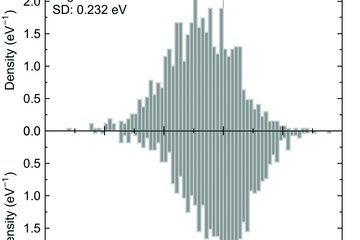All genres
161.
Talk
Dissecting physics of carbon ordering in bcc iron. Thermec 2025, Toulouse, France (2025)
162.
Talk
Materials design and discovery in high-dimensional chemical and structural configuration spaces. Psi-k 2020 Conference, Lausanne, Switzerland (2024)
163.
Talk
Exploring the Relationship Between Grain Boundary Structure and Chemical Composition at the Atomic Level. International Conference on Intergranular and Interphase Boundaries in Materials (IIB 2024), Beijing, China (2024)
164.
Talk
Metastable Defect Phase Diagrams as a road map for defect design. FLAIR Colloquium talk, Technical University Darmstadt, Darmstadt, Germany (2024)
165.
Talk
Metastable Defect Phase Diagrams as a road map for defect design. TMS Annual Meeting, Orlando, FL, USA (2024)
166.
Talk
Atomic Scale Analysis Reveals the Interplay between Grain Boundary Structure and Composition. MRS 2023, Boston, MA, USA (2023)
167.
Talk
Construction and application of defect phase diagrams: Concepts and computational approaches. Thermec 2023, Vienna, Austria (2023)
168.
Talk
Defect phase diagrams: Concepts, computational approaches and applications. DPG-Frühjahrstagung (DPG Spring Meeting), Dresden, Germany (2023)
169.
Talk
Constructing Defect Phase Diagrams from Ab Initio Calculations and CALPHAD Concepts. TMS Annual Meeting and Exhibition, San Diego, CA, USA (2023)
170.
Talk
Materials design and discovery in high-dimensional chemical and structural configuration spaces. International Conference on Materials Science, Engineering & Technology (Keynote talk), Singapore, Singapore (2022)
171.
Talk
Defect Phase Diagrams: Concepts, Computational Approaches and Materials Design Strategies. MMM10 Conference, Baltimore, MD, USA (2022)
172.
Talk
Ab Initio Descriptors to Guide Materials Design in High-dimensional Chemical and Structural Configuration Spaces. TMS Annual Meeting and Exhibition, San Diego, CA, USA (2022)
173.
Talk
Construction and Application of Defect Phase Diagrams. TMS Annual Meeting and Exhibition, Anaheim, CA, USA (2022)
174.
Talk
NFDI-MatWerk - an overview and discussion of the next steps. Webinar MaterialsWeek2021, online (2021)
175.
Talk
High-throughput optimization of finite temperature phase stabilities: Concepts and application. ICAMS Advanced Discussions, virtual, Bochum, Germany (2021)
176.
Talk
Defect phase diagrams as novel tool to understand and design tailored defect structures in advanced steels. Thermec2021, Virtual Meeting, Vienna, Austria (2021)
177.
Talk
High-throughput optimization of finite temperature phase stabilities: Concepts and application. Thermec'2021, Virtual Conference, Graz, Austria (2021)
178.
Talk
Application of Density Functional Theory in the Context of Phase Diagram Modelling. MSIT Winter School on Materials Chemistry, Virtual Event (2021)
179.
Talk
pyiron – an integrated development environment for ab initio thermodynamics. Potential Workshop, ICAMS, virtual, Bochum, Germany (2021)
180.
Talk
High-throughput optimization of finite temperature phase stabilities: Concepts and application. Coffee with Max Planck, virtual seminar organized by the MPIE, Düsseldorf, Germany (2021)











